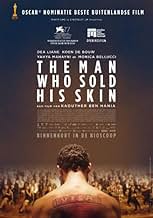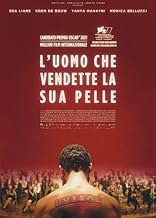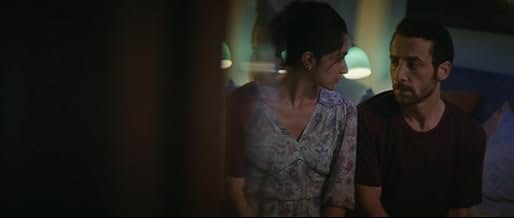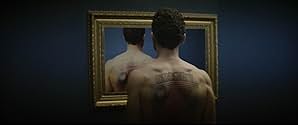AVALIAÇÃO DA IMDb
6,9/10
7,5 mil
SUA AVALIAÇÃO
A viagem de Sam Ali, um sírio que fugiu para o Líbano para escapar da guerra síria, na esperança de se reunir com seu amante em Paris.A viagem de Sam Ali, um sírio que fugiu para o Líbano para escapar da guerra síria, na esperança de se reunir com seu amante em Paris.A viagem de Sam Ali, um sírio que fugiu para o Líbano para escapar da guerra síria, na esperança de se reunir com seu amante em Paris.
- Indicado a 1 Oscar
- 9 vitórias e 12 indicações no total
Koen De Bouw
- Jeffrey Godefroi
- (as Koen de Bouw)
Avaliações em destaque
Let's just keep in mind that this movie isn't the type of a satirical work that is meant to tackle its subject matter by probing it or offering a deeper understanding of the whole situation and, definitely, not to reach a resolution. It's rather more akin to a cautionary tale, or one that shines a spotlight on the social and political situations and what they entail, exposing the superficiality of them all by explicitly reflecting it on a seemingly unrelated surface, which is here art. Excuse my ignorance of the term that would spare me all that rambling. I just wanted to remind some people (myself included) who can easily mistake this for being too on-the-nose that it's actually intentionally so, the thing that could be clearly noticed through its self-awareness of its pretentiousness, and I couldn't imagine a more competent way to mirror that than espousing art.
The Man Who Sold His Skin revolves around a highly provocative subject of a Syrian refugee, Sam Ali, in Beirut who accepts a deal offered to him by a contemporary artist, Jeffrey Godefroi, to have his back turned into a living work of art in order to travel to Belgium. As a contemporary take on a Faustian deal, the movie truly shines. It's true this story is about a man who sells his skin (hence his identity) to the artist, Jeffrey, (he even mentioned that he sees himself as Mephistopheles) in return for "freedom," but here the protagonist is marked by a pronounced stigma, namely the Visa tattooed on his back, "this work of art bears the signature of the devil," said Mr. Waltz and his wife justifying the reason why they bought Sam. He became a flesh-and-blood example of the exploitation Syrian refugees, although he willingly became one, mainly to live with the love of his life, Abeer. That leads us to the main complaint I have with this movie: the love story, or rather the drama surrounds it.
The movie quickly makes us abandon any thought the story would be heavy on its prickly themes of human trafficking, exploitation and the commodification of people, declaring out loud it's a love story through and through. But here is the thing, the romantic dramedy elements here are too pedestrian and the characterizations severely lacking in nuance to keep me invested. Consequently, the movie drags quite often. The story also tries to stir a few emotional chords by the end, trying as hard as it can to bring out more of its potential to be a reflective drama. Suffice it to say, it falls flat on the emotional punch. What really bogged this movie down is its dense caustic encapsulation, which although it lends the social commentary the edge it needed, it definitely does seem completely discordant with both the dramatic and the romantic aspects, hindering the heart and levity from seeping out of the surface.
As art takes the centre stage, the cinematography doesn't skimp on its artistic ambitions. First movie that popped into my head watching the stunning, garish visuals in the scenes set in the gallery is Velvet Buzzsaw (Dan Gilroy's latest effort, also centred around art,) but instead of only serving its sole purpose of giving a hazardous sense, here it surpasses that by expressing the inner feelings of the characters. The compositions, in particular, that involved two or more characters resulted in some of the best shots I've seen in any movie from last year; they are truly eloquent when it comes to juxtaposing the characters' emotions and thoughts.
(6/10)
The Man Who Sold His Skin revolves around a highly provocative subject of a Syrian refugee, Sam Ali, in Beirut who accepts a deal offered to him by a contemporary artist, Jeffrey Godefroi, to have his back turned into a living work of art in order to travel to Belgium. As a contemporary take on a Faustian deal, the movie truly shines. It's true this story is about a man who sells his skin (hence his identity) to the artist, Jeffrey, (he even mentioned that he sees himself as Mephistopheles) in return for "freedom," but here the protagonist is marked by a pronounced stigma, namely the Visa tattooed on his back, "this work of art bears the signature of the devil," said Mr. Waltz and his wife justifying the reason why they bought Sam. He became a flesh-and-blood example of the exploitation Syrian refugees, although he willingly became one, mainly to live with the love of his life, Abeer. That leads us to the main complaint I have with this movie: the love story, or rather the drama surrounds it.
The movie quickly makes us abandon any thought the story would be heavy on its prickly themes of human trafficking, exploitation and the commodification of people, declaring out loud it's a love story through and through. But here is the thing, the romantic dramedy elements here are too pedestrian and the characterizations severely lacking in nuance to keep me invested. Consequently, the movie drags quite often. The story also tries to stir a few emotional chords by the end, trying as hard as it can to bring out more of its potential to be a reflective drama. Suffice it to say, it falls flat on the emotional punch. What really bogged this movie down is its dense caustic encapsulation, which although it lends the social commentary the edge it needed, it definitely does seem completely discordant with both the dramatic and the romantic aspects, hindering the heart and levity from seeping out of the surface.
As art takes the centre stage, the cinematography doesn't skimp on its artistic ambitions. First movie that popped into my head watching the stunning, garish visuals in the scenes set in the gallery is Velvet Buzzsaw (Dan Gilroy's latest effort, also centred around art,) but instead of only serving its sole purpose of giving a hazardous sense, here it surpasses that by expressing the inner feelings of the characters. The compositions, in particular, that involved two or more characters resulted in some of the best shots I've seen in any movie from last year; they are truly eloquent when it comes to juxtaposing the characters' emotions and thoughts.
(6/10)
I hadn't realised that was by a Tunisian director. She did a good job to get Syrians to play nearly all of the principal parts. It really irritates me when the accents don't match the supposed country when I watch an Arabic-language film and I always wonder why so many films make do with impersonations. I used to live in Syria, so it is even worse when the actors are playing (and failing) the various Syrian accents.
I was also pleased to see that there was very little propaganda against His Excellency Bashar al-Assad, the elected President of Syria. He was referred to as a dictator at one point; I wish the translation on the subtitles had said "Autarch" which might have been better. However, despite the freedoms experienced by Syrians before the attack on her, the results of the scene in the train during the marriage proposal and its subsequent sequels are wearily familiar as were the family connections used as a solution.
Life as a refugee was shown unflinchingly. I have had experience of some of the tricks and strategies used by migrants to stay alive - I live in a different Arab country now and see sub-Saharan immigrants at exhibitions where food will be served so they can get a meal for free just as Sam and his friends do in the film.
It's at one of these exhibitions that Sam's life changes. He makes a pact that will allow him to follow his love to Europe to fulfil a promise and a dream. He has contracted out his body.
Not everything goes smoothly, of course. There wouldn't have been a film if it had. That the hour and forty four minutes flew past is a testament to the power of the storyline and plot development. The last two twists in the final minutes of the film had me in the depths of despair; I'd seen the first one coming. What else would DAESH had done? There's another development after that which resolves the film completely.
I had had this waiting to be watched for a month or so. Last night was an ideal time to watch; I was relaxed and ready for it. I recommend the film.
I was also pleased to see that there was very little propaganda against His Excellency Bashar al-Assad, the elected President of Syria. He was referred to as a dictator at one point; I wish the translation on the subtitles had said "Autarch" which might have been better. However, despite the freedoms experienced by Syrians before the attack on her, the results of the scene in the train during the marriage proposal and its subsequent sequels are wearily familiar as were the family connections used as a solution.
Life as a refugee was shown unflinchingly. I have had experience of some of the tricks and strategies used by migrants to stay alive - I live in a different Arab country now and see sub-Saharan immigrants at exhibitions where food will be served so they can get a meal for free just as Sam and his friends do in the film.
It's at one of these exhibitions that Sam's life changes. He makes a pact that will allow him to follow his love to Europe to fulfil a promise and a dream. He has contracted out his body.
Not everything goes smoothly, of course. There wouldn't have been a film if it had. That the hour and forty four minutes flew past is a testament to the power of the storyline and plot development. The last two twists in the final minutes of the film had me in the depths of despair; I'd seen the first one coming. What else would DAESH had done? There's another development after that which resolves the film completely.
I had had this waiting to be watched for a month or so. Last night was an ideal time to watch; I was relaxed and ready for it. I recommend the film.
"The Man Who Sold His Skin," Tunisia's first ever International Feature Film nominee at the Academy Awards, reminded me a lot of the movie "Synonyms" from last year. Both are about men who have been exiled from their countries of origin -- in one the man is a Syrian refugee, in the other a young man self exiles himself from the oppressive military culture of Israel. In both films, the men find themselves turned into commodities by their adopted countries, welcomed only as much as they can prove themselves to be useful. I liked both films quite a lot, "Synonyms" probably a bit more, but "The Man Who Sold His Skin" is quite good in its own right.
It's apparently based on a true story, though I always take that claim with a grain of salt. The man at the film's center agrees to have his entire back tattooed with a visa that allows refugees to travel freely through Europe, which turns him into a living work of art on display in museums and galleries. The lack of narrative subtlety is compensated for by a striking visual style. This film looks beautiful, nearly every scene offering the viewer composition just begging to be admired. Indeed, at times it's almost a little too beautiful, too carefully composed, as if the director just couldn't help but make choices that would draw attention to themselves. But it's a sin I can forgive when the results are a movie that looks as good as this one does.
Grade: A.
It's apparently based on a true story, though I always take that claim with a grain of salt. The man at the film's center agrees to have his entire back tattooed with a visa that allows refugees to travel freely through Europe, which turns him into a living work of art on display in museums and galleries. The lack of narrative subtlety is compensated for by a striking visual style. This film looks beautiful, nearly every scene offering the viewer composition just begging to be admired. Indeed, at times it's almost a little too beautiful, too carefully composed, as if the director just couldn't help but make choices that would draw attention to themselves. But it's a sin I can forgive when the results are a movie that looks as good as this one does.
Grade: A.
The Man Who Sold His Skin is a pretty good movie. And it's one about art that to an extent shares my feelings and opinions of it. Meaning, that I was naturally inclined to like it as soon as I understood what was going on... And I did.
But the movie comes with its own collection of flaws that are a little too big to miss. The greatest complaint I have is that the movie overall seemed aimless. Aimless in that there was no one destination the writers felt comfortable diving deep into. Rather, the movie keeps itself safe on the surface; often finding itself at the door of a sophisticated and thought provoking conflict, but hesitates entering or engaging with those questions. Another minor complaint is the ending; which after all what the movie has been about, felt a little too cheesy.
Overall, I like what the movie is about, and I'm glad I watched it. The complaints I have are not too great to prevent one from enjoying the movie.
But the movie comes with its own collection of flaws that are a little too big to miss. The greatest complaint I have is that the movie overall seemed aimless. Aimless in that there was no one destination the writers felt comfortable diving deep into. Rather, the movie keeps itself safe on the surface; often finding itself at the door of a sophisticated and thought provoking conflict, but hesitates entering or engaging with those questions. Another minor complaint is the ending; which after all what the movie has been about, felt a little too cheesy.
Overall, I like what the movie is about, and I'm glad I watched it. The complaints I have are not too great to prevent one from enjoying the movie.
"The Man Who Sold His Skin" is a visually stunning and thought-provoking film that delves into the themes of identity, personal sacrifice, and the commodification of human life. Through its exploration of the contemporary art world, it raises thought-provoking questions about the boundaries between art and exploitation. With exceptional performances, particularly from Yahya Mahayni as the protagonist, and exquisite cinematography that captures the juxtaposition of beauty and brutality, this film leaves a lasting impact on viewers. It is a captivating and memorable cinematic experience that skillfully combines social commentary, romance, and dark humor to create a unique and thought-provoking narrative. As the story unfolds, the film prompts reflection on the power dynamics at play in society and the sacrifices individuals make for personal freedom. "The Man Who Sold His Skin" is a true standout in its ability to engage, provoke, and resonate long after the credits roll.
Você sabia?
- CuriosidadesWhile director Kaouther Ben Hania was visiting the Louvre Museum in Paris in 2012, there was a retrospective of Belgian artist Wim Delvoye. There she saw, in Napoleon III's apartments, Delvoye's Tim (2006 - 08), in which the artist had tattooed the back of Tim Steiner, who was sitting on an armchair with his shirt off displaying Delvoye's design. The piece was sold to a German art collector and Tim is contractually obliged to spend a certain amount of time, topless and sitting still, in a gallery every year. Wim Delvoye appears in the movie as the insurance guy.
- Erros de gravaçãoWhen Sam Ali changes his seat at the train at 05:55, the place of the man in the back seat changes each time the camera switches between Sam and Abeer.
- ConexõesFeatured in A 93ª edição do Oscar (2021)
- Trilhas sonorasFiliae maestae Jerusalem, RV 638: I, 'Filiae maestae Jerusalem'
Music by Antonio Vivaldi (uncredited)
Conducted and Performed by Philippe Jaroussky (Audio) (p)
Performed by Ensemble Artaserse (uncredited)
2014 Erato/Warner Classics, Warner Music UK Ltd.
Principais escolhas
Faça login para avaliar e ver a lista de recomendações personalizadas
- How long is The Man Who Sold His Skin?Fornecido pela Alexa
Detalhes
- Data de lançamento
- Países de origem
- Centrais de atendimento oficiais
- Idiomas
- Também conhecido como
- The Man Who Sold His Skin
- Locações de filme
- Empresas de produção
- Consulte mais créditos da empresa na IMDbPro
Bilheteria
- Orçamento
- € 2.230.000 (estimativa)
- Faturamento bruto mundial
- US$ 227.290
- Tempo de duração
- 1 h 44 min(104 min)
- Cor
- Mixagem de som
- Proporção
- 2.39 : 1
Contribua para esta página
Sugerir uma alteração ou adicionar conteúdo ausente





























